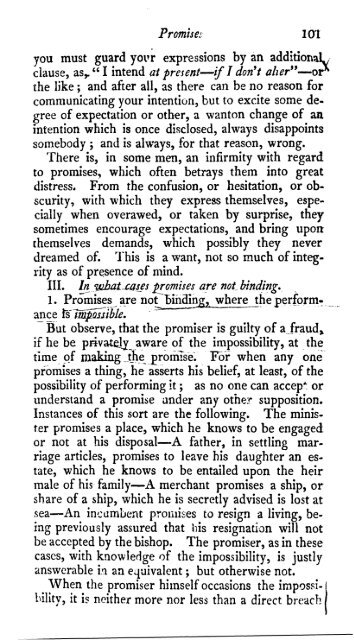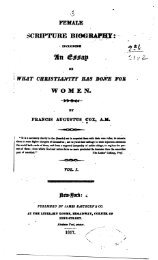- Page 1 and 2:
PRINCIPLES OP MOlUL AND POLITICAL P
- Page 3 and 4:
[ iv ] to advance the discovery, co
- Page 5 and 6:
[ vi ] tion, with '\vhich the grati
- Page 7 and 8:
PREFACE. IN the treatises that I ha
- Page 9 and 10:
I'ltEF AC 'f:. . Xl planations whic
- Page 11 and 12:
RFYACE. Inanner may be P.elt~ .. fj
- Page 13 and 14:
PREFACE. eci ; l'l('r 2 tllat i~ !i
- Page 15 and 16:
CON'T EN'1S. BOOK I. PR~LIMI NARY C
- Page 17 and 18:
BOOK III. PART III.-Of R!:LATIVE DU
- Page 19 and 20:
$ 5= If BOOK I. r == Preliminary Co
- Page 21 and 22:
The LlrdJ of the Ltmd. 25 Whereas e
- Page 23 and 24:
The Scriptures .. 27 gence and comp
- Page 25 and 26:
The Moral Sen.re'. Now the question
- Page 27 and 28:
The Moral Sense. 31 have been set u
- Page 29 and 30:
The Moral Sense. 53 Another conside
- Page 31 and 32:
Htl11llJR HoppineJ~. 58 sages of wh
- Page 33 and 34:
HU~lan HappitlclI. 37 the pleasures
- Page 35 and 36:
IIlilJZan Ilappincsse 39 ~tullious
- Page 37 and 38:
Hunlon Happine;fs. 41 makes no diff
- Page 39 and 40:
IJunlon IItIPpil1CSJ. It scr:-ins t
- Page 41 and 42:
HlU1f!an Happiness. 45 than what is
- Page 43 and 44:
Human Happiness. 3ame sum of money:
- Page 45 and 46: Virtue. 49 Towards God; as piety, r
- Page 47 and 48: Virtue. 5i might not indulge his hu
- Page 49 and 50: 59 a just economy I)f Providence, t
- Page 51 and 52: Tr· ~ Irlue". \vhich 113th ten tal
- Page 53 and 54: Moral Obliglltitm. 57 (as will appe
- Page 55 and 56: M ol'al Obligation. 59 CHAPTER III.
- Page 57 and 58: The Willo/'God. .61 -I work. The_~f
- Page 59 and 60: The Divine Benevolence. The llletho
- Page 61 and 62: The Divine Bene'Voiente. 65 the use
- Page 63 and 64: LTtiJity. 67 and pe9ury; or ~ust j
- Page 65 and 66: The Necessity oJGeneral Rules. i,9
- Page 67 and 68: General Come'luetlces pursued. 71 j
- Page 69 and 70: Of Right • . Frf'm the principles
- Page 71 and 72: The Division of Rights. 75 with the
- Page 73 and 74: ------ ."-~ ....... ___ .i --- ____
- Page 75 and 76: The Djtt'isi~n of Rights. 79 him th
- Page 77 and 78: The General Rights of 1Jfankind. 81
- Page 79 and 80: The General Rights of Mankind. 83 c
- Page 81 and 82: The General Rightl oj M4itHnJ. 85 w
- Page 83 and 84: . " . • BOOK III . Relative D ttt
- Page 85 and 86: Institution of Properly. .9 this so
- Page 87 and 88: The History oj Property. 91 the sec
- Page 89 and 90: PrDperty in Land. 98 neighbourhood,
- Page 91 and 92: Property in Land. 95 these accounts
- Page 93 and 94: Pronziscs. 97 rice of the demand up
- Page 95: Pronlises. 99 interve" ~jon of prom
- Page 99 and 100: ProT/lises. lOS whatever she asked,
- Page 101 and 102: Promises. 105 their obligation; for
- Page 103 and 104: PrOiiliscs. 107 both pClrties; and
- Page 105 and 106: Contracls. 109 made. The few instan
- Page 107 and 108: i1i ranit in the thing to be sold,
- Page 109 and 110: Contracts of Hazard. 11 g exception
- Page 111 and 112: Contracts of Lending, Ufc. 115 hims
- Page 113 and 114: Contracts concerning the Lending Gl
- Page 115 and 116: Lending of Mone'y' 119 It is a ques
- Page 117 and 118: Lending 'J/ JJfoney 121 JYdts it ou
- Page 119 and 120: Service. 123 Clerks and apprentices
- Page 121 and 122: Commissions. 125 them that are your
- Page 123 and 124: C'OlnnlisJ ions, 127 !ies at the ti
- Page 125 and 126: 1~9 l)c diminished, by this rule B
- Page 127 and 128: J,~ O./fices. lSI every duty, which
- Page 129 and 130: ( ~. . f 1" .) h- h Ie h· t l:crt?
- Page 131 and 132: Lies. IS5 Nice distinctions are OUt
- Page 133 and 134: • Olllhs. 137 .£.. mongst the Gr
- Page 135 and 136: Oaths. 189 great King; neither shal
- Page 137 and 138: 14-1 knowledge, power, and justit~,
- Page 139 and 140: Ooth if Alltgill1W. ~quaint~--d ; b
- Page 141 and 142: 145 , 1 Y happens in despotic gover
- Page 143 and 144: 14-7 Jr for my use 2nd benefit, dir
- Page 145 and 146: Oath against Sim1n)'. 14-9 - ... .-
- Page 147 and 148:
SltbjcripliolU to Articles of Rdigi
- Page 149 and 150:
ISS ~Jr between the teachers and th
- Page 151 and 152:
Wills. }55 man make his will, devis
- Page 153 and 154:
-7-· •• $';' liiI. ;nay b~ equ
- Page 155 and 156:
·'. i t - -- BOOK III. 3 p- .Relat
- Page 157 and 158:
Slavery. 161 that good usage is thr
- Page 159 and 160:
Sil/r;)cry. 163 after all, what is
- Page 161 and 162:
Professional Assiltonte. 165 oirgum
- Page 163 and 164:
p&cunillT] Bounll. CHAPTER v. CHARI
- Page 165 and 166:
PctUrJaTl Bounll· 169 pitiating th
- Page 167 and 168:
Pecunia'), Bounty. 1 '71 benefactor
- Page 169 and 170:
Pecuniary BOllnty. 173 s~~th in sec
- Page 171 and 172:
Pecuniary Bounty. i7S 5. " 'I'hat t
- Page 173 and 174:
177- It becomes sinful, or contradi
- Page 175 and 176:
Re1Je11gc. 179 I say this~ and you
- Page 177 and 178:
Revenge. 181 fi·om us a vote to wh
- Page 179 and 180:
Duelling. 183 ..,irtue itself: The
- Page 181 and 182:
Duel/ing. 18:5 1n return, I forbear
- Page 183 and 184:
LitigaticlZ. 187 whilst others desp
- Page 185 and 186:
Graljttide~ 189 ;OU5 00 ~ks or pict
- Page 187 and 188:
i91 CHAPTER XII. SLANDER. SPEAKING
- Page 189 and 190:
Slander, 19S sins of inconsideratio
- Page 191 and 192:
1. The private comfort of individua
- Page 193 and 194:
lornicatiott. ]-97 .,.,ho infest po
- Page 195 and 196:
Fornication. 199 the danger of grea
- Page 197 and 198:
Seduct;~n. 201 mischief from so mea
- Page 199 and 200:
20S As a woman collects her virtue
- Page 201 and 202:
Adultery- AU behaviour, which is de
- Page 203 and 204:
Adultery. to accuse him before the
- Page 205 and 206:
POlyg411lY· 209 wit.hin three degr
- Page 207 and 208:
Polygamy. 211 they may be likely to
- Page 209 and 210:
Of DifJOrte. 21S The ancient Med~s
- Page 211 and 212:
Of Divorce. 21S ~uring the jodit li
- Page 213 and 214:
Of DifJorte. ~17 of personal imbeci
- Page 215 and 216:
Of D jvorcc. 219 and her marrying a
- Page 217 and 218:
Marriage. 221 CHAPTER VIII. MARRIAG
- Page 219 and 220:
Marriage. institution, or the plain
- Page 221 and 222:
Duty of Parents. 225 Ination of the
- Page 223 and 224:
DUly of Parents 227 that the parent
- Page 225 and 226:
Duty of P arenls. 229 ifying, if no
- Page 227 and 228:
DUly of PaTenll. 231 .Ali attention
- Page 229 and 230:
Dlil1 ~f P I1rtnls. any case justi!
- Page 231 and 232:
Dut! if ParentI. 235 consult a chil
- Page 233 and 234:
Rights of Parents. 287 Something li
- Page 235 and 236:
Dut, rf Chi/dre.n. 256 90ns in nune
- Page 237 and 238:
Dldy if Cl-ildrm. A parent has, in
- Page 239 and 240:
DIlIJ r/ ChiJdrnt. 248 and not that
- Page 241 and 242:
not be contended to be for the augm
- Page 243 and 244:
CHAPTER n. 247 DRUNKENNESS. DR Ulf-
- Page 245 and 246:
Drunkenne/J'. ~49 tirunken revels o
- Page 247 and 248:
Fouch a tavern. 251 And this may be
- Page 249 and 250:
Suicide. 259 propose many possible
- Page 251 and 252:
SuicilJe. p('rhaps, than the most p
- Page 253 and 254:
Su;cidl. .257 -.A. seeking relief i
- Page 255 and 256:
• • • ... BOOK v. Duties f07.
- Page 257 and 258:
DUly tmd Efficocy of PrtlJcr. agre~
- Page 259 and 260:
Duty and Efficacy oj PraJ'er. 26S a
- Page 261 and 262:
Duty Qlui FJicacy oj Prayer. 26:) .
- Page 263 and 264:
DUly Ilnd Efficacy cf Prayer. 267 ~
- Page 265 and 266:
Duty and Efficacy oj Pr(Jyer 269 Go
- Page 267 and 268:
Duty lind Efficacy oj Pray!,., 27!
- Page 269 and 270:
Duty and Efficacy of Prayer. 273 ~h
- Page 271 and 272:
Farms 0/ Prayer in Public liVorship
- Page 273 and 274:
277 prayer composed in one age, bec
- Page 275 and 276:
til Public fVorJblp. ence, and. the
- Page 277 and 278:
Sabbatical ltzltituli()llS oy silen
- Page 279 and 280:
Sabbatical InstitutiollS. not more
- Page 281 and 282:
·the LlJrd h;J.fh gi1Jen you tht :
- Page 283 and 284:
Sabl'aticai [lUi ituti(ins. 287 1£
- Page 285 and 286:
289 tllents, which, if a man do, he
- Page 287 and 288:
Sabllaticai Institut;oI1S. stituted
- Page 289 and 290:
[~batical Institution!. 293 tloy of
- Page 291 and 292:
Yio/atiCin of the Christintl Sabbat
- Page 293 and 294:
Uf Re·vcrcnci12g tbe Deil)'. £crv
- Page 295 and 296:
Vi Reverencing the Deii] :299 .auth
- Page 297 and 298:
Of Rt1.Jermcing tbe Dcit),. Christ
- Page 299 and 300:
01 Reverencing the Dei1fmanagement
- Page 301 and 302:
BOOK VI. ?Z - -- -- -. 5-----, 5 -
- Page 303 and 304:
.f),jpin fI.f ,-~ivil Gavtrnmtnt. '
- Page 305 and 306:
Subjection to Civil GO'lJernmcm. S0
- Page 307 and 308:
,., ,.. ". -I G 4)Utijtct:~'!! t~ ~
- Page 309 and 310:
S"bi!'c!i{)n to Civil Govermnent. .
- Page 311 and 312:
Duty of Suhmission expjoined. g 1 S
- Page 313 and 314:
Duty oj Submission explained. S~ 7
- Page 315 and 316:
Dut! of Supmissi(Jn explained. 319
- Page 317 and 318:
Duty of SuomissiolJ tltplaitlld. "1
- Page 319 and 320:
~reign Dut.y t SZlbmi!Jion explaine
- Page 321 and 322:
DUly oj Submission explainetJ. J2J
- Page 323 and 324:
Duty of C:'L'i/ Obedience. 827 ~mpo
- Page 325 and 326:
as staled in the ScriplureJ. 329 Jo
- Page 327 and 328:
as s/lIled in the Scriptures. SSI t
- Page 329 and 330:
itS stated in the Scripture&\. ~~::
- Page 331 and 332:
33J ;Jose, the com~un~calion of. hu
- Page 333 and 334:
~i10uili be con,- ~ved to a lazaret
- Page 335 and 336:
Ci'IJil Liberty. 399 the exclusive
- Page 337 and 338:
841 III. A REPUBLIC, or democracy,
- Page 339 and 340:
if G(;'V{r1l1lltnt. -845 The same o
- Page 341 and 342:
or et'en by the la\Vles5 wiil of an
- Page 343 and 344:
tif Government. 347 most liable to
- Page 345 and 346:
British Constitution .. 549 these c
- Page 347 and 348:
British C011siitution. 351 Mo~t of
- Page 349 and 350:
'~O be delivered from tIle uneasine
- Page 351 and 352:
British Constitution. S5~; Qf gover
- Page 353 and 354:
Britisli Constitution. 857 The repr
- Page 355 and 356:
British COlzstitution. S59 .. i.s c
- Page 357 and 358:
Britis/l COIlSlilliltOll. S61 ~1l c
- Page 359 and 360:
SSg ,·Lnd \\:jtl:. the sentiments
- Page 361 and 362:
Bril'iJh Constitution. ~65 usually
- Page 363 and 364:
British Constitution. S67 first pla
- Page 365 and 366:
British Constitution. 369 dlan what
- Page 367 and 368:
lJritjsh Constltutio1J, grea.:, or
- Page 369 and 370:
Britisl, CCllS Iii zlti{;r;. ~ny rp
- Page 371 and 372:
Of the Administration of J:!stice.
- Page 373 and 374:
OJ"the Adnzmistratifin of lustice.
- Page 375 and 376:
Of the Administration of Justice. 3
- Page 377 and 378:
Of the AdminiJtration if Justice. :
- Page 379 and 380:
OJ the Administratioll if Justice.
- Page 381 and 382:
·"reai.~r inconn~ni~n~v than that
- Page 383 and 384:
OJ :he .Adm;'l:drut;~1E of Justice.
- Page 385 and 386:
Of tilt A.Jminislration of Justice.
- Page 387 and 388:
Of the Administration of JustiGe. ~
- Page 389 and 390:
Of tbe Administration oj Justice. 3
- Page 391 and 392:
Of Crimes a1ld Punisbm~ntJ. 395 to
- Page 393 and 394:
Of Crimes olzd Punishments. 897 oft
- Page 395 and 396:
Of Crimes and Punishmentl. agg of h
- Page 397 and 398:
(}JA Crill1t'S fllZd Pll1lishnzents
- Page 399 and 400:
Of Crimes and Punishments. 4:03 the
- Page 401 and 402:
Of Crimel and Punisl}mentl. 405 the
- Page 403 and 404:
OJ Crimes and Punishments. 407 with
- Page 405 and 406:
Vf' G'ri1llts lind PunZSiJnlents. 4
- Page 407 and 408:
Of Crimes and Punishments. 41 ] to
- Page 409 and 410:
Of Crimes and Punisbmccts. 413 spee
- Page 411 and 412:
Of Religous Ertahlishmenls. ..15 ra
- Page 413 and 414:
alld oj"'l o/eratloIZ. 417 other el
- Page 415 and 416:
an.d of Toleration .• 419 . fl()~
- Page 417 and 418:
I and if Toleration. 421 (·:'SS of
- Page 419 and 420:
tllzd 'f ToleratiDn. 42S without S0
- Page 421 and 422:
and ofTol1!'N: 1 ion. 425 some soli
- Page 423 and 424:
.nd of Tolerllt;on. 427 tic!es to b
- Page 425 and 426:
and of Toleration. 4i9 hCi:8 transg
- Page 427 and 428:
and of To/el-at;(jn. 481 I I to be
- Page 429 and 430:
and if Tolel.1tiol;. 4SS fonn of Ch
- Page 431 and 432:
and if Toleration. 435 stance, and
- Page 433 and 434:
I fended. and of 11!craliolt. 4S7 O
- Page 435 and 436:
and of Toleration. 4:59 I I • I a
- Page 437 and 438:
~·i.\r:cr,ltl(rt, ail j CI)Jl11}le
- Page 439 and 440:
Agriculture, and Commrrcc. 44-5 ..:
- Page 441 and 442:
"5 Agriculture, op.d Cr;mmfr(e. hab
- Page 443 and 444:
Agricullure, and CfJ11lmertt. 447 !
- Page 445 and 446:
Agriculture, and Commerce. . 449 I
- Page 447 and 448:
; I l , I I I r . Agriculture, OM C
- Page 449 and 450:
Agriculture, IJnd Commerce. 4.,9 th
- Page 451 and 452:
Agriculture, and Commerce. 4!JJ ula
- Page 453 and 454:
Atritulture, Il7ld Commerce. 411 A
- Page 455 and 456:
A'gricultuI"lJ, and Commf:rci. 459
- Page 457 and 458:
AgritUJture, and Cotnmtrte. 46! or
- Page 459 and 460:
Agriculture, and Commerce. 463 •
- Page 461 and 462:
6! ·." ...,.. r , , C I I ,. .,. ,
- Page 463 and 464:
... ~gricultilrC', alz,i C01Iln}Cre
- Page 465 and 466:
Agriculture, 011d Conlmerce. 46£1
- Page 467 and 468:
Agriculture, and Commerce. 471 tion
- Page 469 and 470:
Agriculture, and Commerce. .7S From
- Page 471 and 472:
t I ! ~ ,. ;1 f ~" . Agriculture~ a
- Page 473 and 474:
0/ War, and of lAiiita,., E!tablizh
- Page 475 and 476:
Milit~ry Establisbments. 479 t.hat
- Page 477 and 478:
i~lililary Ejtabjishmcnlj~ 481 newl
- Page 479 and 480:
Mi/itor1 Establishments. 483 to vin
- Page 481 and 482:
Military Establishments. 485 edges
- Page 483 and 484:
llIilitary E;tahlishmellis. 487 gen
- Page 485 and 486:
MI",';t', r), Frfnl,l; r j'"J1r.";t
- Page 487 and 488:
• J.~iili:ary Estttblishments. 49





